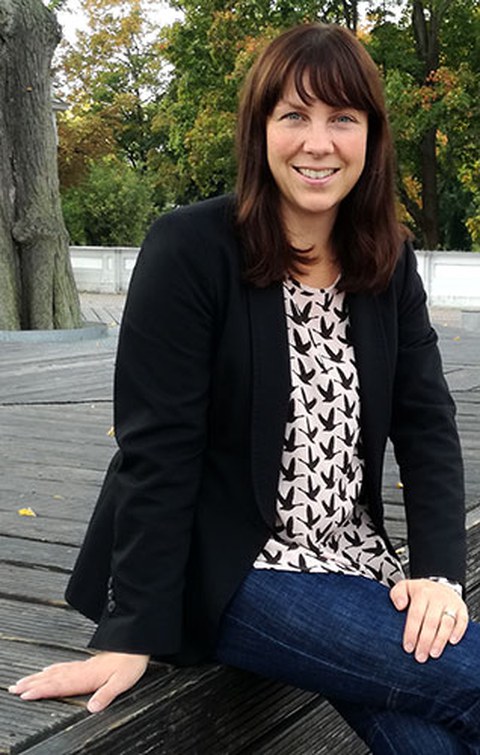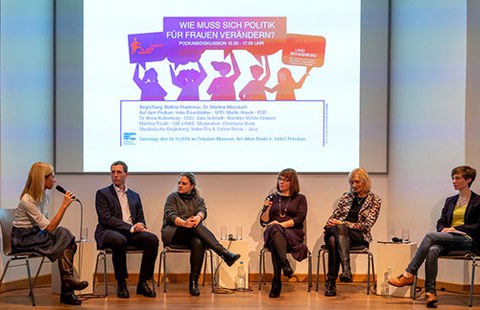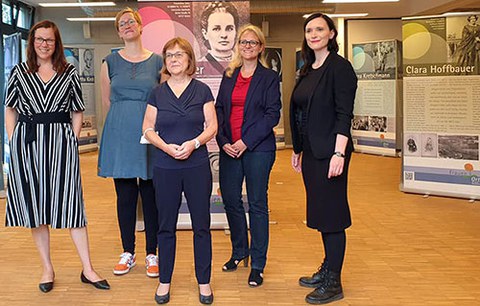Communication is Essential for Gender Equality
(Interview from 2021)
Dagmar Möbius
Christiane Bonk is the Equal Opportunities Officer of the City of Oranienburg and Chair of the State Commission of Municipal Equal Opportunities Officers for the State of Brandenburg.
“The date is fortuitous,” the 42-year-old says with a smile when asked about her birthday – March 8, International Women’s Day. But it wasn’t until her studies at TU Dresden that Christiane Bonk, native of Brandenburg, came into contact with the topic of gender equality.

Christiane Bonk is an expert in communications and political science
Well before finishing high school, Christiane Bonk knew that she wanted to be a journalist. She enjoyed writing and while still in school, she worked in the editing department of her local newspaper – the Märkische Oderzeitung. She barely even considered other careers as an option. “If I had to do it all over again today, psychology would be on the table,” she says in retrospect. But she was able to convince her father, “who considers himself a feminist” and drew her attention to the topic, although there was “no money in it.” Since she wanted to set her sights a bit broader, she applied to study communication at TUD, with minors in political science and modern history. Dresden was closer than Münster – another city she was considering for her studies – and closer to her family. Plus, it was where her father came from. “The communication program’s good reputation was also a deciding factor, as were the beautiful city with lots of green spaces and TUD’s compact campus.”
In addition to others, she has Prof. Wolfgang Donsbach (†) to thank for introducing her to the topic closest to her heart. “He showed me the way,” she says. As a Student Assistant at the Chair of Communications, she supported his work by researching, documenting, creating literature lists and preparing advanced seminars. “He once asked us what newspapers we read. Everyone mentioned established newspapers such as Frankfurter Allgemeine Zeitung, Süddeutsche Zeitung and others. ‘And no one reads BILD [Translator’s note: A tabloid newspaper known for sensationalism]?,’ he asked, and added, ‘That’s a mistake. Taking in different types of media is part of the discipline. You should know what the headlines are.’” From writing articles to holding presentations to moderating workshops, she still benefits from the methods taught back then. “Communication is essential in my profession.” One of the first term papers she had to write was about structural differences between men and women in the German Democratic Republic. Later she researched ladies-in-waiting during the Middle Ages. “It was exciting!” Alongside her studies, she also wrote for the Sächsische Zeitung newspaper and the ad rem student publication. “I conducted a lot of surveys and took to the streets with my camera. The Waldschlösschen bridge, which had not yet been built at that time, was an ongoing topic of discussion.”
After finishing her undergraduate studies in 2022, Christiane Bonk wanted to get to know another university and pursued her Magister degree at Freie Universität Berlin. “I would sometimes ask myself why I ever left,” she laughs. She always looks forward to opportunities to visit the city again. She returned to Dresden for an internship at the PR firm then called Kohtes Klewes (known today as Pleon). This afforded her the opportunity to learn a lot about public relations and project management. The internship was followed by a student job at a PR firm in Berlin. “I dove right into my career immediately after finishing my studies,” she recounts. “Since I was just in my mid-twenties, I was charged with communicating topics such as data protection with customers like Microsoft. It wasn’t really my thing,” she realized and switched to a communication firm, where she mapped out and supported projects for federal and state ministries in the fields of equal opportunity, gender and diversity.
Christiane Bonk began working as an advisor, trainer and moderator for EAF Berlin – the European Academy for Women in Politics and Commerce. “I was mostly working on the issues of balancing work and family life, women in leadership positions, women’s political participation and parity in politics,” she explains. One project she worked on was the development of the Federal Ministry for Women’s anniversary campaign “100 years of women’s suffrage” alongside Dr. Uta Kletzing. “I didn’t really want to leave;” she says. But she saw the job advertisement for Equal Opportunities Officer in Oranienburg in 2018 and applied. This is where Christiane Bonk now lives with her family, including her 9-year-old son, 7-year-old twin daughters. “Despite not having had any experience working in administration, I applied because there is something to be said for working where you live,” she says. And she got the job.

In November 2019, Christiane Bonk (middle) moderated an event for “Frauen auf’s Podium” – “Women Onstage”
“Everything just fell into place. I’ve always just done what I could identify with,” Christiane Bonk reflects. She finds it inspiring to work at grassroots level and receive direct feedback from people. “Smaller events with just 30 or 40 people enable more in-depth conversations,” she says, adding, “A lot can get done when you discuss federal or state political topics at the local level.”
As Chair of the State Commission of Municipal Equal Opportunities Officers for the State of Brandenburg, Christiane Bonk knows that the officers in this position in Brandenburg have relatively few rights compared to their counterparts in other states. She is working to change this. “The plan of action from the Istanbul Convention ratified by Germany in 2018 still has not been embraced by many municipalities. There is still a lot to do with regard to gender-based violence against women.” She would also like to improve women’s political participation. “Making up only 27% of Brandenburg’s local councils, they are very underrepresented.” She also seeks to break down traditional roles. Young people should start talk about an equal division of domestic labor at an early stage when looking for a partner. “I don’t have a universal solution,” she says. But progress has been made in the last years – from fathers taking paternity leave to Brandenburg’s (albeit short-lived) gender parity law.

Christiane Bonk (left) provided support for the tenth anniversary of “Frauenorte Brandenburg” (“Women’s Places Brandenburg) as Chair in the Women’s Political Council. Also in attendance was Ursula Nonnemacher (middle), Minister of Social Affairs, Health, Integration and Consumer Protection in Brandenburg.
The communications expert and political scientist does typical association work, speaks with politicians and ministries, and brings initiatives together. However, she’s not interested in getting involved in party politics. “Surprisingly, I’ve been asked that question a lot recently,” she grins, adding, “I’m much more the advising type.” For Christiane Bonk, gender equality involves universal tasks that affect all areas. Equal opportunities and participation, self-determination in career and life choices as well as social diversity beyond traditional gender roles, prejudices and backward-looking thought patterns are the topics to which she has dedicated her life. Whenever she thinks about this, she also thinks about her formative years studying in Dresden.
Contact:
Christiane Bonk
Stadt Oranienburg
Der Bürgermeister, Gleichstellungsbeauftragte
Schloßplatz 1
16515 Oranienburg
Tel.: +49 3301-600 606
Email
Website
